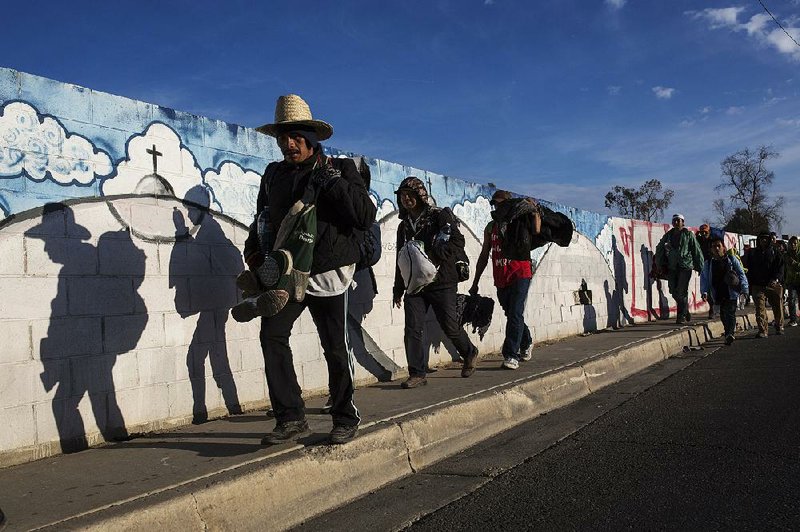TIJUANA, Mexico -- Officials in the Mexican border city of Tijuana said they have arrested 34 members of the caravan of Central Americans for minor offenses and turned them over for deportation.
A Tijuana city statement late Monday said the 34 -- apparently all men -- were arrested for drug possession, public intoxication, disturbing the peace and resisting police, and added they would be deported to their home countries. The main caravan has between 4,000 and 6,000 participants, so those arrested represent less than 1 percent of the total.
Tijuana Mayor Juan Manuel Gastelum has made a point of saying the city is not comfortable with the influx that began arriving last week, and he compared the Central American group unfavorably with about 3,000 Haitians who ended up in the city bordering San Diego on a failed bid to reach the United States last year.
"The Haitians arrived with their papers, with a clear vision," Gastelum said in an interview posted on the city's Facebook page. They came "in an orderly way, they never asked us for food or shelter," renting apartments and making their own food. He said the Haitians found jobs and "inserted themselves in the city's economy" and had not been involved in any disturbances.
The Mexican government gave the Haitians temporary transit permits, and after they failed in attempts to enter the United States, many have since applied for Mexican residency. The majority in the Central American caravan have refused Mexico's repeated offers of residency or asylum, and vowed to cross the border.
The caravan of Central Americans, he said "had arrived all of sudden, with a lot of people -- not all ... but a lot -- were aggressive and cocky."
Officials in President Donald Trump's administration, who have portrayed the caravans as a threat to the United States, have said there were as many as 500 criminals in the groups heading northward, but they haven't said what the crimes were and said they could not reveal the source of the number because they were protecting intelligence sources.
Meanwhile, a temporary shelter for families recently opened in San Diego. The San Diego Rapid Response Network opened the shelter in response to the federal government's decision to end a program that helped asylum-seeking families get to their final destinations in the U.S. after they crossed the border.
The temporary shelter can hold about 150 people. Its main dormitory has about 70 green cots, and several other rooms in the building have cots stacked in the corners to convert into sleeping spaces at night. A few cribs are scattered throughout.
Though a given family spends only one or two nights there, the shelter has remained at capacity in recent days.
Separately, nearly 6,000 U.S. troops rushed to the border with Mexico shortly before the midterm election could begin withdrawing this week, but some administration officials are worried about curtailing the mission too quickly.
The first troops to be withdrawn are likely to be engineering units that have largely finished installing razor wire and building obstacles at border crossing points.
Pentagon officials previously have said that the orders sending troops to the border specified they were authorized until Dec. 15, unless the Department of Homeland Security requested an extension.
If an extension is approved, officials said, the goal is to have all the troops home by Christmas.
The push to begin sending some home more quickly, first reported by Politico, comes from commanders who say there is no reason to keep the troops away from their families at Thanksgiving after their assigned mission has been accomplished.
Trump officials fear that starting the withdrawal will intensify criticism that the deployment was politically motivated rather than a necessary use of military troops. Some lawmakers are vowing to open a congressional investigation of the operation when Democrats take control of the House in January.
The Pentagon is estimating the cost of the military's mission on the U.S.-Mexico border will be about $210 million under current plans.
The total includes about $72 million for the 5,900 active-duty troops providing support to Customs and Border Protection, plus $138 million so far for 2,100 National Guard troops who have been performing a separate border mission since April.
The figures were reported Tuesday to Congress but not announced by the Pentagon. A copy of the report was obtained by The Associated Press.
The total would grow beyond the current estimate of $210 million if the active-duty mission is extended beyond the current completion date of Dec. 15.
Information for this article was contributed by Julie Watson, Mark Stevenson, Robert Burns and Colleen Long of The Associated Press; by David S. Cloud of the Los Angeles Times; and by Kate Morrissey of The San Diego Union-Tribune.
A Section on 11/21/2018
